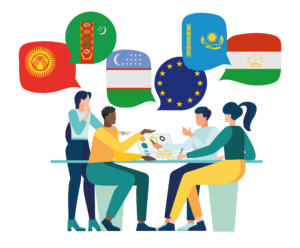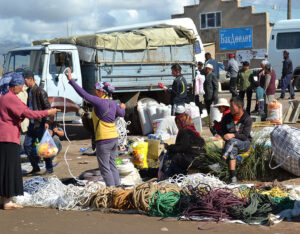EU Human Rights and Democratisation Assistance to Central Asia: In Need of Further Reform

Introduction
One of the declared priorities of the European Union (EU) in Central Asia is the strengthening of good governance, rule of law, human rights and democratisation. Given the EU’s limited financial resources and leverage in the region, and the unfavourable domestic conditions for democratisation, one can hardly expect European efforts to result in a significant liberalisation of Central Asian political regimes. Yet, EU assistance to local civil society can enhance social participation, which provides a foundation for a bottom-up democratisation process.
In these terms, the EU thematic programmes – the Non-State Actors and Local Authorities in Development (NSA/LA), and the European Instrument for Democracy and Human Rights (EIDHR) – primarily operating in Kazakhstan, Kyrgyzstan and Tajikistan are of particular relevance. Uzbekistan continues to benefit from the Institution Building and Partnership Programme (IBPP); a funding mechanism that is no longer active in other countries. However, Turkmenistan is practically excluded from all these initiatives.
A distinct feature of the IBPP, the NSA/LA and the EIDHR is that they provide support not to the governments of the respective states – as is the case with mainstream assistance – but to civil society organisations. The instruments are thus assumed to be contributing directly to the development of both the non-governmental sector and pluralist societies in the beneficiary countries.
This policy brief reviews the programming documents, procedures and implementation of the IBPP, the NSA/LA and the EIDHR with regard to Central Asia. Their impact and deficiencies are evaluated, and the brief concludes with recommendations for the further planning and operation of these programmes.
An Overview
The IBPP-Support to Civil Society and Local Initiatives was established within the broader TACIS(1) framework in 2001. The funding was intended for small-scale projects implemented by European NGOs, local authorities (municipalities) and non-profit organisations in the CIS countries, including Central Asia. From 2001-2007, 43 projects were supported through the IBPP in Kyrgyzstan, Kazakhstan, Tajikistan and Uzbekistan, with grants varying from €100,000 to €200,000.
With the reform of EU financing structures and the establishment of the Development Cooperation Instrument (DCI) in 2007, a new thematic programme, Non-State Actors and Local Authorities in Development, was introduced.(2) This programme was supposed to replace the IBPP in the countries previously benefiting from the TACIS. However, in Uzbekistan the IBPP projects are still running with €2.2 million of funding allocated through the former 2008 Action Programme. The IBPP operates on the basis of the Annual Action Programmes (AAPs), which are subject to financing agreements between the EU and the recipient country. As Uzbekistan did not sign the financing agreement for the 2008 AAP in due time, following the existing rules of procedure the European Commission re-committed the allocated sum to the 2010 AAP. The latest IBPP call for proposals was therefore announced only in February 2011.
Both of these instruments, the IBPP and the NSA/LA, target the non-governmental sector and local governing authorities with the aim of strengthening their capacities. The NSA/LA – as part of the DCI – has a clear focus on poverty reduction and basic services provision. Nevertheless, its programme documents include performance indicators endorsing participatory democracy components as part of the selection process for projects. The IBPP – formerly part of the TACIS – concentrates on institution and capacity-building as the way to address the consequences of political, economic and social transition, thus allowing for the integration of projects in specific sectors with democracy building activities – at least at the programming level. A distinct feature of the IBPP is that its launch and implementation require the approval of the target country’s government through the signing of annual financing agreements. This makes the programme dependent on these governments’ consent.
While the IBPP and the NSA/LA include local authorities as potential beneficiaries, the EIDHR provides financial support specifically to civil society actors engaged in issues of human rights and democratic development. In addition, the EIDHR operates without the need for signing agreements with the governments of the target countries. In this respect, it should “complement the various other tools for implementation of EU policies on democracy and human rights”.(3) The present instrument is a successor to the European Initiative for Democracy and Human Rights, which was created in 1994 and focused predominantly on human rights related actions. The more recent EIDHR programme documents put an equal emphasis on the support to human rights, democratisation processes(4) and strengthening civil society. From 2008-2011, a total of €6.9 million was allocated to Kyrgyzstan, Kazakhstan and Tajikistan via EIDHR Country-Based Support Schemes (grants for local NGOs ranging from €10,000 to €300,000).(5) This could be complemented by awarding macro-funding to international organisations through EIDHR global calls for proposals. The table below summarises recent allocations through the EIDHR, the NSA/LA and the IBPP to each of the Central Asian countries.
The IBPP, NSA/LA and EIDHR Assistance to Central Asia 2008-2011 (allocated amount in €)
| EIDHR (CBSS) | NSA/LA | IBPP | |
| Kazakhstan | 2,400,000 | 2,300,000 | not active |
| Kyrgyzstan | 2,700,000 | 1,950,000 | not active |
| Tajikistan | 1,800,000 | 1,850,000 | not active |
| Turkmenistan | not active | not active | not active |
| Uzbekistan | not active | not active | 2,200,000 |
As the table demonstrates, the three programmes have not covered all the Central Asian states. Over the last few years, IBPP implementation continued only in Uzbekistan. The NSA/LA assistance has been provided primarily to Kyrgyzstan, Kazakhstan and Tajikistan, and the EIDHR micro-support scheme has also been active in these three countries, whereas Uzbekistan and Turkmenistan were only targeted by a few regional (macro-) projects. According to EU officials, this is mainly due to the absence of EU delegations on the ground to manage the NSA/LA and the EIDHR small grants,(6) but also due to the nature of the regimes and the very difficult environment for state-independent NGOs to operate.
Key Findings
Throughout the whole period of the IBPP’s implementation the programme met with clear differences in each state’s commitment to EU assistance. While from 2001-2007 the programme operated relatively smoothly in Kyrgyzstan, Kazakhstan and Tajikistan, its functioning in Uzbekistan was severely challenged after EU sanctions had been introduced following the Andijan events in 2005. In addition to problems at the negotiation stage and over the signing of financing agreements for the 2005 and 2008 Annual Action Programmes, the implementation of several previously launched projects was affected. A few projects touching upon sensitive human rights issues could not be fully implemented.(7) At the same time, in 2008 a €155,000 IBPP grant was awarded to a project co-implemented by the National Centre for Children’s Social Adaptation, a government-organised NGO directly accountable to Uzbekistan’s Cabinet of Ministers and headed by President Karimov’s daughter. In 2011, the same organisation (co-funded by the state) received a €3.7 million grant from the EU under a different budget line. This suggests that the allocated funds had to be spent by the European Commission regardless of the state’s commitment to EU assistance or who the beneficiary was.
The emphasis is on socially-oriented projects, not directly on human rights and democracy. Very few IBPP projects addressed such issues as observance of migrants’ rights and torture prevention, and none of them were aimed at strengthening core democratic principles such as support of electoral processes and democratic public institutions. In the case of NSA/LA projects, an emphasis has been placed on capacity-building of NGOs, education and social services provision as part of the poverty alleviation strategy. Only the EIDHR projects focus on a variety of human rights, governance and rule of law related issues, including abolition of the death penalty, torture prevention, observance of women’s and children’s rights, protection of human rights defenders, and promotion of citizens’ political participation.
Yet, it is strange that EIDHR projects are disconnected from the regular EU Human Rights Dialogues with the Central Asian states and the related Civil Society Seminars.(8) Instead of supporting the dialogue process by providing a practical and financial follow-up for the discussions, the EIDHR implementation by the Commission’s DG DEVCO and the EU delegations continued pursuing their own priority of calling for project proposals. Therefore the recommendations and propositions during the official dialogue rounds and the civil society seminars remain shallow discussions that are not translated into a tangible assistance strategy. This reflects the existing coordination difficulties between the various EU institutions, especially the European External Action Service (EEAS) and DEVCO, which apparently have not been resolved through the Lisbon Treaty.
Whether the EIDHR, the NSA/LA and the IBPP have had broader effects on the development of the non-governmental sector in Central Asia also remains doubtful. Due to the very complex grant application procedures and challenging project management conditions, only a small number of NGOs, which had previously developed sufficient capacities, could benefit from EU support. One example is the EIDHR and the NSA/LA requirement to cover at least 10 per cent of project costs from the NGO’s own sources in order to be eligible for assistance.(9) Considering the size of the EU small grants (currently varying from €10,000 to €300,000), this means that an NGO needs to contribute up to €30,000 from its own budget or attract additional third party funding. But even €1,000 as a mandatory own cost-share is often unaffordable for smaller CSOs. Furthermore, all documents and forms that need to be completed for a grant application are provided in the English language. This presents an additional challenge for local NGOs, which struggle for their existence and cannot count on qualified English speakers among their staff and volunteers.(10) Given the limited capacities of the Central Asian non-governmental sector, these requirements hardly meet local realities. As a result, the same (mainly well-established) NGOs repeatedly become beneficiaries of EU funding, whereas less-experienced organisations and community initiatives are practically excluded. This limits the potential of the EU assistance to have a greater impact on the development of civil society in Central Asia.
Finally, the EU assistance programmes lack transparency. The EU delegations’ websites at best contain an overview of the ongoing projects, from which it is not always possible to distinguish between the various budget lines through which these projects are financed. Information about the completed projects is extremely limited. While the Commission’s website provides compendia of the recently funded EIDHR projects, no open source includes references to the concluded IBPP support. The results of project monitoring and evaluation are mostly not publicly available, although there is no apparent reason why this information should be restricted. The lack of such data impedes independent assessment of the effectiveness of the programming in this field with a view to lessons-learnt.
The Way Ahead
The identified deficiencies reveal the need for reform of the EU’s democracy and human rights related assistance instruments in order to increase their effectiveness and impact. However, the value of the current support should not be underestimated. Even though the IBPP and the NSA/LA projects do not directly contribute to the Central Asian regimes’ democratisation or the strengthening of political rights, they fulfil an important social function by responding to basic human needs, often those of vulnerable groups that are not (sufficiently) supported by the state. Despite the abovementioned shortcomings, EU support is highly appreciated by Central Asian civil society actors, as the assistance provides an opportunity for their growth and further professionalisation, which in the end contributes to the development of pluralist societies.
Where financing is agreed with these governments the EU would do well to ensure that grants are awarded to the organisations that are genuinely in need of support to carry out their activities. This is particularly the case in Uzbekistan, where the IBPP implementation continues, as all CSOs are required to be officially registered with the Ministry of Justice and state funding is only available to government-organised NGOs. With a view to future assistance, a decision needs to be taken whether a format similar to the IBPP should be continued in Uzbekistan because implementation of EIDHR and the NSA/LA small project support does not seem to be possible at present. This decision must be informed by a comprehensive assessment of the situation and the needs of local civil society, but also of what the IBPP has been able to achieve so far. If the operation and results of the programme are severely affected by the political environment, the assistance should not be continued solely for the sake of spending previously committed funds.
With regard to the EIDHR and the NSA/LA implementation, a specific coordination mechanism between the EEAS, DG DEVCO and the EU delegations could be created that would allow integration of the issues discussed during the Human Rights Dialogues and civil society seminars into the scope of the programmes. This mechanism could be activated during the phase of the calls for proposal preparation, which would guarantee inclusion of the previous dialogue subjects into the project selection process. The mechanism could also become a first step in overcoming the general coordination deficits between the various EU institutions.
Concerning the delivery of EU assistance, there is a need for simplification of the grant application and project management procedures. The revival of the practice of preliminary application with brief project concept notes is a welcome development although the process remains complicated for local institutions even in the initial phase of concept notes. But next to this technicality the establishment of an ultra-simple instrument with mini-grants of €5,000 to €10,000 would be a valuable asset in supporting grassroots civil society organisations in the region. The instrument could operate without the co-financing requirement, and ideally with project proposals submitted in local languages or at least in Russian, a common language of intercultural communication in Central Asia. This idea – although deemed reasonable in Central Asian conditions – is often opposed with the argument that it would increase programmes’ operation costs, as more staff would be needed to administer the grants. Here, the example in Georgia of the more flexible micro-project funding provided through the Confidence Building Early Response Mechanism (COBERM) from the EU’s Instrument for Stability and co-managed with the UNDP might serve as inspiration.
Finally, it is necessary to increase the transparency of EU initiatives by presenting comprehensive information about completed and ongoing projects supported through EU funds on the websites of the European Commission and the delegations. This though should not apply to EIDHR supported projects of a sensitive nature that could harm local NGOs who are at risk of government persecution. Increasing the amount of information and ease of access to it might in turn also help the EU become more visible in the region. In the latter case, providing information in local languages would considerably raise awareness of EU engagement among the public and potential assistance recipients.
With the gradual withdrawal of western donors from Central Asia, the European Union may soon become one of the very few pro-democratic actors in the region. This weakens prospects for democratisation but at the same time increases the significance of EU assistance. While reforms are clearly needed, it is no time for the EU to reduce its support to state-independent civil society organisations, which will not be able to survive without external funding.
Implementation of profound changes in EU assistance will demand political and institutional will from European decision-makers. Readiness to take the initiative and the ability to settle the internal conflict of interests between the various EU institutions, as well as between the more pragmatically and the more normatively oriented EU member states, will determine the further development of the European Union as an international actor in the field of democracy and human rights support.
- TACIS: Technical Assistance to the Commonwealth of Independent States. Launched by the European Commission in 1991, the TACIS Programme provided grant-financed technical aid to 12 post-Soviet countries (excluding the Baltic States), and mainly aimed at enhancing economic and political transition processes in these countries.
- The programme replaced the ‘Co-financing with NGOs’ and ‘Decentralised Cooperation’ budget lines.
- Regulation (EC) No. 1889/2006 of the European Parliament and of the Council of 20 December 2006 on establishing a financial instrument for the promotion of democracy and human rights worldwide, Official Journal of the European Union, 29 December 2006, p. 2.
- The EU documents do not provide clear differentiation between the concepts of democratisation and human rights. On the contrary, the interdependence of these concepts with regard to their substance is repeatedly emphasised. Here, democratisation support refers to support of electoral processes, democratic public institutions, citizens’ political participation and representation, or observance of political freedoms and rights.
- Prior to 2007, the micro-grants size varied from €10,000 to €100,000.
- The EU is represented through a Europa House in Ashgabat that does not have official diplomatic status or capacities to run the programmes. In Tashkent, the EU is currently in the process of opening a full-fledged delegation.
- Particularly, two projects aimed at the capacity-building of NGOs advocating for better access to justice, and for the rights of refugees and displaced persons experienced difficulties in carrying out their activities. One of the projects had to be ended after six months following the closure of the Uzbek partner organisation.
- The dialogues are currently organised by the EEAS with the objectives of enhancing cooperation on human rights, raising the relevant concerns, gathering information, and launching initiatives to improve the human rights situation in the countries concerned. In this regard, the dialogues are supposed to feed into the EIDHR project support.
- For the IBPP grants, NGO’s own cost-share is supposed to constitute at least 20 per cent.
- Another – even more trivial – example is the necessity to register via the Commission’s PADOR (Potential Applicant Data Online Registration) system in order to apply for a grant. Access to the system and all forms that need to be filled in can be obtained through the Commission’s website. Yet, in order to be able to download the documents or register via PADOR, one needs to have a stable and speedy internet connection, which is rarely available in rural areas throughout Central Asia.



![shutterstock_1240181551 [Omgezet]](https://eucentralasia.eu/wp-content/uploads/2024/10/shutterstock_1240181551-Omgezet-300x248.jpg)



